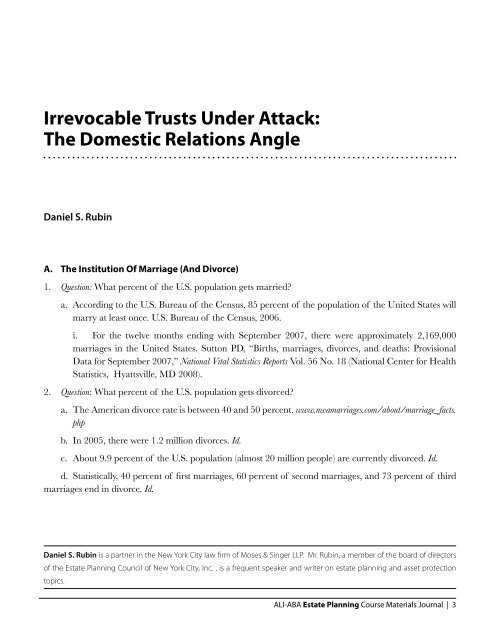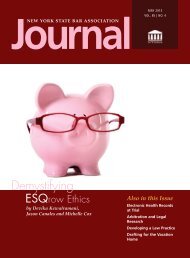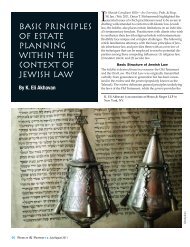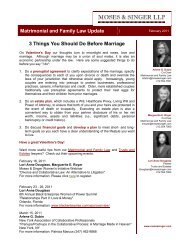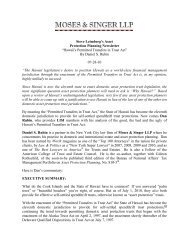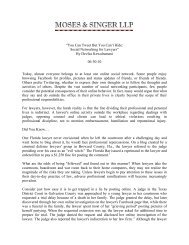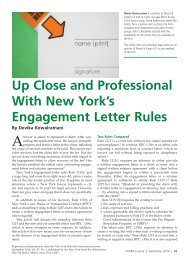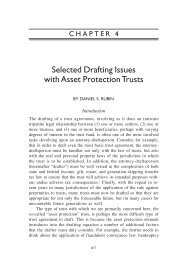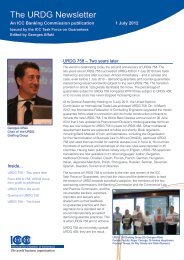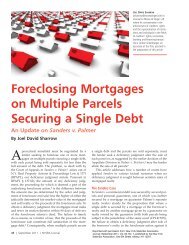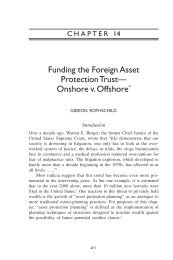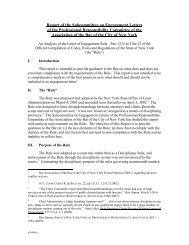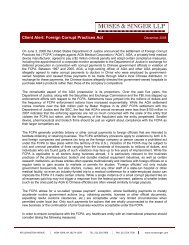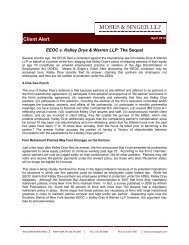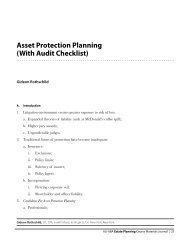Irrevocable Trusts Under Attack: The Domestic Relations Angle
Irrevocable Trusts Under Attack: The Domestic Relations Angle
Irrevocable Trusts Under Attack: The Domestic Relations Angle
Create successful ePaper yourself
Turn your PDF publications into a flip-book with our unique Google optimized e-Paper software.
<strong>Irrevocable</strong> <strong>Trusts</strong> <strong>Under</strong> <strong>Attack</strong>:<strong>The</strong> <strong>Domestic</strong> <strong>Relations</strong> <strong>Angle</strong>Daniel S. RubinA. <strong>The</strong> Institution Of Marriage (And Divorce)1. Question: What percent of the U.S. population gets married?a. According to the U.S. Bureau of the Census, 85 percent of the population of the United States willmarry at least once. U.S. Bureau of the Census, 2006.i. For the twelve months ending with September 2007, there were approximately 2,169,000marriages in the United States. Sutton PD, “Births, marriages, divorces, and deaths: ProvisionalData for September 2007,” National Vital Statistics Reports Vol. 56 No. 18 (National Center for HealthStatistics, Hyattsville, MD 2008).2. Question: What percent of the U.S. population gets divorced?a. <strong>The</strong> American divorce rate is between 40 and 50 percent. www.nwamarriages.com/about/marriage_facts.phpb. In 2005, there were 1.2 million divorces. Id.c. About 9.9 percent of the U.S. population (almost 20 million people) are currently divorced. Id.d. Statistically, 40 percent of first marriages, 60 percent of second marriages, and 73 percent of thirdmarriages end in divorce. Id.Daniel S. Rubin is a partner in the New York City law firm of Moses & Singer LLP. Mr. Rubin, a member of the board of directorsof the Estate Planning Council of New York City, Inc. , is a frequent speaker and writer on estate planning and asset protectiontopics.ALI-ABA Estate Planning Course Materials Journal | 3
4 | ALI-ABA Estate Planning Course Materials Journal April 2009i. <strong>The</strong> probability of a first marriage ending in separation or divorce within five years is 20percent. Bramlett MD and Mosher WD, “Cohabitation, Marriage, Divorce, and Remarriage inthe United States,” Vital Health Stat 23(22) (National Center for Health Statistics 2002).(1) After 10 years, the probability of a first marriage ending in separation or divorce is 33percent. Id.ii. <strong>The</strong> probability of a second marriage ending in separation or divorce within five years is 23percent. Id.(1) After 10 years, the probability of a second marriage ending in separation or divorce is 39percent. Id.3. Question: What percent of the U.S. population gets married more than once?a. In 2004, 52.2 percent of men previously divorced were remarried. www.census.gov/population/www/socdemo/marr-div/2004detailed_tables.htmlb. In 2004, 43.5 percent of women previously divorced were remarried. Id.B. <strong>The</strong> Prevalence Of <strong>Trusts</strong>1. Question: How many trusts are created each year?a. <strong>The</strong>re is no way to determine the number of new trusts created each year because the InternalRevenue Service does not provide specific information regarding the number of trusts created eachyear. However, in 2006, 3.7 million estates and trusts filed income tax returns. Table 2. Numberof Returns Filed, by Type of Return, Fiscal Years 2005 and 2006, available at www.irs.gov/taxstats/compliancestats/article/0,,id=97168,00.html2. Question: How much property is held in trust, approximately?a. Again, there is no way to determine the value of property held in trust. However, one mightextra polate the significance of trust-owned property from the fact that, in 2003, estates and trustsreported aggregate gross income worth $85.2 billion, of which approximately 71 percent, or $60.6billion, was trust income. Lisa Schreiber, Fiduciary Income Tax Returns, Filing Years 2003 and2004, available at www.irs.gov/taxstats/indtaxstats/article/0,,id=96425,00.htmlC. Why Should We Care About <strong>The</strong>se Statistics?1. At the risk of stating the obvious, the confluence of multiple marriages, and multiple divorces, withhundreds of billions or trillions of dollars of property held in trust for the benefit of one or the otherof the spouses breeds contention over the issue of when trust property should be available to meet theobligations of a beneficiary to pay alimony (hereinafter generally referred to as “spousal support” orsimply “support”).
<strong>Irrevocable</strong> <strong>Trusts</strong> <strong>Under</strong> <strong>Attack</strong> | 5D. What Is This Outline/Presentation About?1. In the Summer 2002 edition of the Asset Protection Journal, Vol. 4, No. 2, the author presentedan article entitled “When Your Child’s Marriage Goes Bad, So Might Your Child’s Trust: Spousaland Child Support Exceptions to Spendthrift Trust Protections.” This outline will serve to examine,in further and updated detail, the issue of spendthrift (and other types of trust) protections againstattacks by a spouse or former spouse for support.a. For a quick reference on this issue, please refer to the state by state chart (with the District ofColumbia included as well) at the end of this outline.E. Types Of <strong>Trusts</strong>1. As a preliminary matter, it is important to note the various types of trusts that may bear on the issueunder discussion. Notably, trusts may contain features pertaining to one or more of the various typesof trusts under discussion.2. Spendthrift <strong>Trusts</strong>a. “<strong>The</strong> term ‘spendthrift trust’ refers to a trust that restrains voluntary and involuntary alienation ofall or any of the beneficiaries’ interests.” Restatement (Third) of <strong>Trusts</strong> §58, General Comment (ALI2003).b. “<strong>Trusts</strong> in which the interest of a beneficiary cannot be assigned by him or reached by his creditorshave come to be known as ‘spendthrift trusts.’” 2A Austin W. Scott & William F. Fratcher, <strong>The</strong> Lawof <strong>Trusts</strong> §151, at 83 (4th ed. 1987).3. Discretionary <strong>Trusts</strong>a. A “discretionary” trust is a trust in which distributions to the beneficiary are left wholly within thediscretion of the trustee, generally without regard to any ascertainable standard.b. A discretionary trust is a trust “where the trustee or another party has the right to accumulate(rather than pay out) the income for each year. Depending on the terms of the trust instrument,such income may be accumulated for future distributions to the income beneficiaries or added tocorpus for the benefit of the remaindermen.” Black’s Law Dictionary 467 (6th ed. 1990).4. Support <strong>Trusts</strong>a. A “support trust” is “[a] trust in which the trustee has the power to pay the beneficiary only somuch of the trust income as is necessary for the beneficiary’s support, education and maintenance.”Black’s Law Dictionary 1513 (6th ed. 1990). See also, Restatement (Second) of <strong>Trusts</strong> §154, cmt. d (1959)(A “support trust” is one in which “by the terms of the trust the amount to be paid to or appliedfor the beneficiary is limited to so much of the income or principal as is in fact necessary for hiseducation or support.”)c. In essence, support trusts are a subset of discretionary trusts in which the trustee’s discretion tomake a distribution to the beneficiary is limited to reasons of the beneficiary’s support.
6 | ALI-ABA Estate Planning Course Materials Journal April 2009i. <strong>The</strong> legal distinction between “discretionary” trusts and “support” trusts is, however, disappearing.(1) “[T]his Restatement Third does not attempt to draw a bright line between ‘discretionary’interests . . . and ‘support’ interests . . . . <strong>The</strong> so-called ‘support trust,’ for example, is viewed hereas a discretionary trust with a support standard. This in turn requires asking and examiningall of the questions that follow from that view, such as how a particular standard, in context,is to be interpreted and whether a beneficiary’s other resources are to be taken into accountin making a fiduciary judgment about appropriate distributions to the beneficiary.” Restatement(Third) of <strong>Trusts</strong> §60, Comment a.(2) <strong>The</strong> Uniform Trust Code similarly provides but a single rule and a single section for alldiscretionary trusts, including ones in which the trustee’s discretion is subject to a supportstandard.5. <strong>Trusts</strong> With Forfeiture Provisionsa. A trust might contain a provision that would effect a forfeiture of a beneficiary’s trust interest uponan attempt by the beneficiary to transfer it or an attempt by the beneficiary’s creditors to reach it.i. An example provided by the Restatement (Second) of <strong>Trusts</strong> illustrates:(1) “A transfers property to B in trust to pay the income to C for life and to pay the principal,on C’s death, to D. By the terms of the trust, if C conveys his interest or if his creditors shouldattempt to reach it, or if he should become bankrupt, his interest under the trust shouldcease and the income should be paid to C’s wife during the remainder of C’s life. C becomesbankrupt. His interest under the trust terminates.” Restatement (Second) of <strong>Trusts</strong> §150, illust. 1(1959).F. <strong>The</strong> Nature Of <strong>The</strong> Protection1. Each of the various types of trusts provides some protection against spousal support claims, butthe basis behind the protection differs depending on the type of trust. It is, obviously, important tounderstand why a trust may or may not be protective.2. Spendthrift <strong>Trusts</strong>a. Spendthrift trusts are free from creditors’ claims because the settlor has explicitly provided, throughthe incorporation of a spendthrift provision in the governing instrument, that the trust fund shallbe exempt from the claims of the beneficiary’s creditors. <strong>The</strong> spendthrift trust carries out a statedintent of the settlor.3. <strong>The</strong> maxim “cujus est dare, ejus est disponere,” or “[w]hose it is to give, his it is to dispose” is frequentlycited in connection with references to the validity of spendthrift trust restrictions.a. “<strong>The</strong> validity of a spendthrift provision in a trust is predicated upon the [public policy] considerationthat a person is free to make any desired disposition of his property.” Estate of Johnson, 252 Cal.App.2d 923, 925 (1967).
<strong>Irrevocable</strong> <strong>Trusts</strong> <strong>Under</strong> <strong>Attack</strong> | 7b. According to the United States Supreme Court in Nichols v. Eaton, 91 U.S. 716 at 725 (1875):We concede that there are limitations which public policy or general statutes impose upon all dispositions of property, suchas those designed to prevent perpetuities and accumulations of real estate . . . . We also admit that there is a just and soundpolicy . . . to protect creditors against frauds upon their rights . . . . But the doctrine, that the owner of property . . . cannotso dispose of it, but that the object of his bounty . . . must hold it subject to the debts due his creditors . . . is one which weare not prepared to announce as the doctrine of this court.4. It is often said that the use of a spendthrift trust takes nothing from the beneficiary’s creditor that thecreditor had previously.<strong>The</strong> doctrine that property may be made inalienable by such declaration of a [spendthrift] trust rests upon the theory thata donor has the right to give his property to another upon any conditions which he sees fit to impose, and that, inasmuchas such a gift takes nothing from the prior or subsequent creditors of the beneficiary to which they previously had theright to look for payment, they cannot complain that the donor has provided that the property or income shall go or bepaid personally to the beneficiary and shall not be subject to the claims of creditors. Parscal v. Parscal, 148 Cal.App.3d at1102–1103.5. Discretionary <strong>Trusts</strong>a. <strong>The</strong> effect of a discretionary trust is to limit the extent of the beneficiary’s interest in the trust soas to make it sufficiently tenuous so that it does not qualify as a property right that is subject toattachment by creditors. In effect, the beneficiary’s interest will only come into existence when andto the extent that the trustee decides to make a distribution.b. “[I]f by the terms of a trust it is provided that the trustee shall pay to or apply for a beneficiary onlyso much of the income and principal or either as the trustee in his uncontrolled discretion shall seefit to pay or apply, a transferee or creditor of the beneficiary cannot compel the trustee to pay anypart of the income or principal.” Restatement (Second) of <strong>Trusts</strong> §155(1) (ALI 1959).i. “In a discretionary trust it is the nature of the beneficiary’s interest rather than a provisionforbidding alienation which prevents the transfer of the beneficiary’s interest. <strong>The</strong> rule . . . is notdependent upon a prohibition of alienation by the settlor; but the transferee or creditor cannotcompel the trustee to pay anything to him because the beneficiary could not compel payment tohimself or application for his own benefit.” Restatement (Second) of <strong>Trusts</strong> §155 cmt. b (ALI 1959).ii. “A transferee or creditor of a trust beneficiary cannot compel the trustee to make discretionarydistributions if the beneficiary personally could not do so.” Restatement (Third) of <strong>Trusts</strong> §60, cmt. e(ALI 2003).iii. Similarly:Where by the terms of the trust a beneficiary is entitled only to so much of the income or principal as the trustee inhis uncontrolled discretion shall see fit to give him, he cannot compel the trustee to pay to him or to apply for his useany part of the trust property. In such a case, an assignee of the interest of the beneficiary cannot compel the trusteeto pay any part of the trust property, nor can creditors of the beneficiary reach any part of the trust property . . . . Ifthe beneficiary himself cannot compel the trustee to pay over any part of the trust fund, his assignee and his creditorsare in no better position. Scott & Fratcher, supra, §155, at 152-54.c. <strong>The</strong> courts will generally not substitute their judgment for the judgment of a trustee as long as thetrustee exercises the trustee’s judgment in good faith and within reasonable bounds.d. In general, a court will only interfere with a trustee’s exercise of or failure to exercise a discretionarydistribution power when an abuse of discretion has been shown to have occurred.
8 | ALI-ABA Estate Planning Course Materials Journal April 2009i. “At the heart of this issue, then, is the critical inquiry whether any court can substitute itsdiscretion for that which a settlor has vested exclusively in the trustee, and thereby force thepremature distribution of trust property by distributing same not to the beneficiary but to hisseizing creditors. We are persuaded that question must be answered in the negative.” Read v. U.S. exrel. Department of Treasury, 169 F.3d 243, 254 (5th Cir. 1999).6. Support <strong>Trusts</strong>a. Like a discretionary trust (and unlike a spendthrift trust), a support trust is protective of thebeneficiary’s interest because of the nature of the beneficiary’s trust interest: the beneficiary isonly entitled to distributions that are, within the trustee’s discretion, required for the beneficiary’ssupport.b. “[I]f by the terms of a trust it is provided that the trustee shall pay or apply only so much of theincome and principal or either as is necessary for the education or support of the beneficiary, thebeneficiary cannot transfer his interest and his creditors cannot reach it.” Restatement (Second) of<strong>Trusts</strong> §154 (ALI 1959).i. “In a trust for support it is the nature of the beneficiary’s interest rather than a provisionforbidding alienation which prevents the transfer of the beneficiary’s interest. <strong>The</strong> rule stated inthis Section is not dependent upon a prohibition of alienation by the settlor; but the transfereeor creditor cannot compel the trustee to pay anything to him, because the beneficiary could notcompel payment or compel application in any way except for the restricted purpose set out in theterms of the trust.” Restatement (Second) of <strong>Trusts</strong> §154 cmt. b (ALI 1959).7. <strong>Trusts</strong> With Forfeiture Provisionsa. As noted, a spendthrift trust is protective of the beneficiary’s interest because of a demonstration ofthe settlor’s intent that the trust be held for the benefit of the beneficiary, and not the beneficiary’screditors, and the beneficiary’s creditors have no real basis to complain since they have lost nothingthat they had previously. And, again as noted, a discretionary trust or a support trust is protectiveof a beneficiary’s interest because the tenuous nature of the beneficiary’s interest does not rise tothe level of a property interest subject to attachment. A trust with a forfeiture provision combineseach of these elements:i. <strong>The</strong> forfeiture provision is an expression of the settlor’s intent that the beneficiary’s creditorsnot have access to the trust fund, and the beneficiary’s creditors have no basis for complaint sincethey have lost nothing that they had previously.ii.<strong>The</strong> forfeiture clause might also be thought to be the epitome of a tenuous beneficial interest.G. Why Would Spousal Support Claims Be An Exception To Trust Protections?1. Spouses with support claims are sometimes called “exception creditors” because their claims are“excepted” from trust protections under certain circumstances. For purposes of comparison, otherexception creditors sometimes include:a. Creditors with claims for necessaries provided to the beneficiary;
<strong>Irrevocable</strong> <strong>Trusts</strong> <strong>Under</strong> <strong>Attack</strong> | 9b. Creditors with claims for services to protect the beneficiary’s interest in the trust;c. Claims by a governmental entity;d. Children with child support claims; ande. (Very rarely) involuntary tort creditors.2. <strong>The</strong> exception for spousal support claims and the claims of dependent children is recognized in boththe Restatement of the Law of <strong>Trusts</strong> and, to a significantly lesser extent, the Uniform Trust Code.a. Section 59(a) of the Restatement (Third) of <strong>Trusts</strong> (ALI 2003), provides that “[t]he interest of abeneficiary in a valid spendthrift trust can be reached in satisfaction of an enforceable claim againstthe beneficiary for support of a child, spouse, or former spouse.”b. This section is carried forward from section 157 of the Restatement (Second) of <strong>Trusts</strong> (ALI 1959),which provided that “[a]lthough a trust is a spendthrift trust or a trust for support, the interest ofthe beneficiary can be reached in satisfaction of an enforceable claim against the beneficiary by thewife or child of the beneficiary for support, or by the wife for alimony.”c. Uniform Trust Code §503(b) and (c) provide that:[a] spendthrift provision is unenforceable against a benficiary’s child, spouse, or former spouse who has a judgmentor court order against the beneficiary for support or maintenance....A claimant against which a spendthrift provisioncannot be enforced may obtain from a court an order attaching present or future distributions to or for the benefit ofthe beneficiary.d. <strong>The</strong> comment to this section of the Uniform Trust Code notes that the quoted subsection “does notauthorize the spousal or child claimant to compel a distribution from the trust.” Instead, UniformTrust Code §504(c) provides that:To the extent a trustee has not complied with a standard of distribution or has abused a discretion: (1) a distributionmay be ordered by the court to satisfy a judgment or court order against the beneficiary for support or maintenance ofthe beneficiary’s child, spouse, or former spouse; and (2) the court shall direct the trustee to pay to the child, spouse, orformer spouse such amount as is equitable under the circumstances but not more than the amount the trustee wouldhave been required to distribute to or for the benefit of the beneficiary had the trustee complied with the standard ornot abused the discretion.e. Per the comment to section 504 of the Uniform Trust Code:Before fixing this amount, the court having jurisdiction over the trust should consider that in setting the respectivesupport award, the family court has already considered the respective needs and assets of the family.3. <strong>The</strong>re are several theoretical bases under which spouses holding support claims are held to be entitledto special access against an otherwise protected trust.4. <strong>The</strong> Settlor’s Intenta. <strong>The</strong> court may find that the settlor did not actually intend for the trust’s spendthrift protectionsto apply against the beneficiary’s spouse or minor dependents. Similarly, the court may find thebeneficiary’s spouse or minor dependent to be an additional, if implied, beneficiary of the trust.i. Consider the absurdity of believing that the settlor actually intended to name the future exson-in-lawor ex-daughter-in-law as a beneficiary of the settlor’s largess. Perhaps the most thatmight be said here of the settlor’s “intent” is that the settlor never actually considered the matter.
10 | ALI-ABA Estate Planning Course Materials Journal April 2009b. “Where the trust is created for the support of the beneficiary . . . the fact that he has dependents isto be taken into consideration . . . <strong>The</strong> result is much the same as though the trust were created, notsolely for the benefit of the beneficiary, but for the benefit of himself and his dependents.” Scott &Fratcher, <strong>The</strong> Law of <strong>Trusts</strong> §157.1, at 190–191.c. In Schwager v. Schwager, 109 F.2d 754 (7th Cir. 1940), the Seventh Circuit Court of Appeals notedthat:no decision, other than predicated upon a statutory provision, has permitted a wife or child to reach a spendthrift trustcreated by a third party for the benefit of the husband without relying in whole or in part upon an intention express orimplied, that the trust fund be thus employed . . .d. <strong>The</strong> Schwager court further noted, however, that:courts have extended themselves at great length to ascertain a favorable intent on the part of the settlor and, in fact, insome of the cases have indulged in a reasoning indicative of the desire sought to be achieved. In such cases, the intenthas been found because of a failure to express a non-intent. Id. at 757.5. Definition Of “Creditor” And “Debt”a. Not necessarily distinct from the question of the settlor’s intent, the court may find that thebeneficiary’s spouse, ex-spouse, and dependent children are not true “creditors” of the beneficiary.Similarly, the court may find that the beneficiary’s legal obligation of support is not a “debt.” Oneither of these bases, a spendthrift provision, at least, would not apply to prevent access to the trustfund by a spouse, ex-spouse, or dependent child for support.i. “<strong>The</strong> will under which the trust in the instant case is created contains a spendthrift clause,prohibiting payment to creditors of the cestui, and it is urged that this provision bars the application.<strong>The</strong> obligation of a parent for the support of his child does not arise from a creditor-debtorrelationship. It is not a debt within the contemplation of the testatrix or the interpretation of theclause.” Marsh v. Scott, 63 A.2d 275, 279 (N.J. Super. Ct. Ch. Div. 1949).ii. “In this State alimony is not a debt. It is a social obligation as well as a pecuniary liability; itis founded on public policy and is for the good of society.” England v. England, 223 Ill. App. 549 (Ill.App. 3 Dist. 1922), citing Deen v. Bloomer, 191 Ill. 416 (Ill. 1901).iii. “<strong>The</strong> question thus presented is whether or not a wife, seeking support from her husband, isa creditor within the meaning of the word as it is used in §3536 and in ITEM II of the will. If thewife is a creditor, then seizure of any of the trust assets on her behalf is prohibited by the terms of§3536 and of ITEM II of the will. <strong>The</strong> Chancellor concluded that the wife was not a creditor inthat meaning of the word, and we agree with that conclusion . . . A wife, under such circumstances,can hardly be a creditor who is defined as ‘one to whom a debt is owing by another person whois the debtor’, Black’s Law Dictionary, Rev. 4th ed.” Garretson v. Garretson, 306 A.2d 737, 740–741(Del. 1973).b. <strong>The</strong> suggestion, however, that the beneficiary’s spouse, ex-spouse, and dependent children arenot true “creditors” of the beneficiary, or that the beneficiary’s legal obligation of support is not a“debt,” is far from universally conceded.
<strong>Irrevocable</strong> <strong>Trusts</strong> <strong>Under</strong> <strong>Attack</strong> | 11i. See, for example, Spencer v. Spencer, 802 A.2d 215, 223 (Conn. App. Ct. 2002) (“Because theplaintiff obtained a judgment against the defendant for alimony and child support, her status isthat of a creditor”).c. Moreover, consider the difficulty that a former spouse making a claim pursuant to a marital contractmight have avoiding being branded a “creditor” seeking to enforce a “debt.” Also, consider whetherthe spouse entitled to support would be considered a “creditor” for fraudulent transfer purposes ifthe moneyed spouse had fraudulently transferred all of his or her assets to a new spouse.6. Public Policy Considerationsa. A trust beneficiary should not be allowed to benefit from a trust while at the same time neglectingsocial and legal obligations to the beneficiary’s child, spouse, or former spouse.b. “[F]reedom of disposition in this country allows a property owner to impose conditions andlimitations on beneficial interests he or she creates in a trust, but only to the extent they are notillegal or contrary to public policy.” Reporter’s Notes on §59 of the Restatement (Third) of <strong>Trusts</strong>,Comments a–a(2).c. “Although a trust is a spendthrift trust or a trust for support, the interest of the beneficiary canbe reached in satisfaction of an enforceable claim against him [or her] for support by his [or herspouse] or children....[because the] beneficiary should not be permitted to have the enjoyment ofhis [or her] interest under the trust while neglecting to support his [or her] dependents.” Restatement(Second) of <strong>Trusts</strong> §157, cmt. b.d. Paragraph (b) of the General Comment to section 59 of the Restatement (Third) of <strong>Trusts</strong> providesthat “[o]n public-policy grounds, the beneficiary should not be permitted to enjoy a beneficialinterest in a trust while neglecting the support of dependents.”e. Stated more emphatically, “[i]t would be shocking indeed to permit a husband to receive andenjoy the whole of the income from a large trust fund and to make no provision for his needydependents.” Scott & Fratcher, supra, §157.1, at 192.i. In addition, it has been said that the state has an interest in ensuring that those who suffer asa result of nonpayment of support and alimony do not become wards of the state.ii. Arguably, spendthrift trusts are sanctioned in the first instance to ensure that the beneficiaryhas necessary living expenses, and that part of a beneficiary’s necessary living expenses is the costof supporting the beneficiary’s spouse and children. See, e.g., Zinke v. Hipkins, 135 N.E. 899 (1922).f. Albeit with regard to child support, not spousal support, the holding of Shelley v. Shelley, 354 P.2d282, 286 (Ore. 1960), notes that:We have no hesitation in declaring that public policy requires that the interest of the beneficiary of a trust should besubject to the claims for support of his children . . . .Certainly, the defendant will accept the societal postulate thatparents have the obligation to support their children. If we give effect to the spendthrift provision to bar the claims forsupport, we have the spectacle of a man enjoying the benefits of a trust immune from claims which are justly due, whilethe community pays for the support of his children . . . . We do not believe that it is sound policy to use the welfarefunds of this state in support of the beneficiary’s children, while he stands behind the shield of immunity created by aspendthrift trust provision. To endorse such a policy and to permit the spectacle which we have described above wouldbe to invite disrespect for the administration of justice.
12 | ALI-ABA Estate Planning Course Materials Journal April 2009g. “Although a spendthrift clause can often be construed as not intended to exclude the beneficiary’sdependents, that is neither the rationale nor the limit of this exception to the general effect . . . ofspendthrift protection. On public-policy grounds, the beneficiary should not be permitted to enjoya beneficial interest in a trust while neglecting the support of dependents.” Comments on Clause(a), Paragraph b, Section 59 of the Restatement (Third) of <strong>Trusts</strong> (ALI 2003).h. According to the Reporter’s Notes on section 59, Comments a–a(2), of the Restatement (Third) of<strong>Trusts</strong>:Significant policy support for the rule of this Section (and the manner of its implementation under this Comment)is also found in federal Bankruptcy Code § 523(a)(5), making nondischargeable the debtor’s obligations for alimony,maintenance, or support of a spouse, former spouse, or child.i. 11 U.S.C. §523(a)(5) provides: “A discharge under. . . this title does not discharge an individualdebtor from any debt . . . for a domestic support obligation.”ii.See also 11 U.S.C. §523(a)(15), which provides:A discharge under . . . this title does not discharge an individual debtor from any debt . . . to a spouse, former spouse,or child of the debtor and not of the kind described in paragraph (5) that is incurred by the debtor in the course of adivorce or separation or in connection with a separation agreement, divorce decree or other order of a court of record,or a determination made in accordance with State or territorial law by a governmental unit.i. In a similar vein, the Employee Retirement Income Security Act of 1974 requires that each planprohibit the assignment or alienation of benefits, but provides that benefits may be reached by aqualified domestic relations order for child support, alimony, and marital property rights. See 29U.S.C. §1056(d)(1); I.R.C. §§401(a)(13)(B), 414(p).i. But is reference to section 523(a)(5) (or section 523(a)(15) for that matter) of the Bankruptcy Codedisingenuous? Although, without a doubt, the existence of an exception to discharge for obligationsfor alimony, maintenance, or support of a spouse, former spouse, or child does demonstrate a publicpolicy, it can hardly be said to provide significant policy support for an exception to the protectionafforded by a trust set up by a third party without any independent obligation to the beneficiary’sspouse, former spouse, or child.ii. In this regard, consider section 541(c)(2) of the Bankruptcy Code, which excludes fromthe bankruptcy estate all property subject to a restriction on transfer that is enforceable under“applicable nonbankruptcy law” and contains no reference to any exception creditors independentof those that might exist under applicable nonbankruptcy law, thus demonstrating some circularityof reasoning in the comment to the Restatement.j. Not all authority on the public policy question points to an exception for spouses with supportclaims. In a number of jurisdictions the dominant public policy consideration is the importance ofeffectuating the settlor’s intent. A key point in this regard is that, absent a self-settled spendthrifttrust, the undeniably important duty of support is a duty imposed on the beneficiary, and is not aduty imposed on the settlor.i. “When a trust of this kind has been created, the law holds that the donor has an individualright of property in the execution of the trust; and to deprive him of it would be a fraud on hisgenerosity . . . .It is always to be remembered that consideration for the beneficiary does not even
<strong>Irrevocable</strong> <strong>Trusts</strong> <strong>Under</strong> <strong>Attack</strong> | 13in the remotest way enter into the policy of the law; it has regard solely to the rights of the donor.Spendthrift trusts can have no other justification than is to be found in considerations affecting thedonor alone. <strong>The</strong>y allow the donor to so control his bounty, through the creation of the trust, thatit may be exempt from liability for the donee’s debts, not because the law is concerned to keep thedonee from wasting it, but because it is concerned to protect the donor’s right to property.” In reMorgan’s Estate, 72A, 498, 499 (1909).ii. “It would serve no good purpose for us to enter into a castigation of the husband for his plainand apparently willful disregard of an obligation imposed upon him by the law of Wisconsin and,in fact, by the laws of all civilized jurisdictions. No doubt there is a thoroughly established publicpolicy which imposes such obligation upon a husband. We are convinced, however, that there isnothing in such policy which requires or, in fact, permits the destruction of a spendthrift trustunder the circumstances presented. In the first place, the policy that a person may dispose of hisproperty according to his own wishes is equally well established. In the instant case, for instance,the testatrix was under no obligation to her son’s wife and children. She was under no obligationto bequeath her property to her son in trust or otherwise. She was at perfect liberty to give it allto a stranger had she so desired. Being thus empowered, it is difficult to ascertain by any ordinaryprocess of reasoning, how or why she should be precluded from disposing of it as she did. <strong>The</strong> wifeand children were not damaged—they were no worse off than before. <strong>The</strong>y were deprived of nomeans afforded by the law to enforce the duty imposed upon the husband for alimony and support.It seems to us that this public policy which plaintiffs seek to invoke, and which finds some supportin the authorities referred to, has been inaptly applied. It is directed solely at the husband, and maybe invoked only against him.” Schwager v. Schwager, 109 F.2d 754, 759-60 (7th Cir. 1940).H. Planning For <strong>The</strong> Possibility Of A <strong>Domestic</strong> <strong>Relations</strong> <strong>Attack</strong>1. Use A Discretionary Trusta. Because the interest of a beneficiary of a discretionary trust does not, in the first instance, qualifyas a property right, even preferred creditors are often precluded from accessing a discretionarytrust in satisfaction of their claims against the beneficiary. See, e.g., First Northwestern Trust Co. of SouthDakota v. Internal Revenue Service, 622 F.2d 387 (8th Cir. 1980).b. “Courts appear more willing to allow claims against spendthrift trusts and trusts for support thanagainst discretionary trusts . . . .In a trust that contains a spendthrift clause as the only protectivedevice, the beneficiary has an absolute right to distributions of income, principal, or both. <strong>The</strong>spendthrift clause protects the assets as long as they remain in the trustee’s hands. Because there isno question that the beneficiary will ultimately receive the distributions, the only real question forthe decision maker is whether the public policy favoring payment of support or alimony obligationsoutweighs the settlor’s intent that the assets be protected . . . .A trust that provides that the trusteeis to make distributions for the support of the beneficiary is conceptually similar to a spendthrifttrust. <strong>The</strong> amount to which the beneficiary is entitled is based on his support needs. <strong>The</strong> trusteehas no power over distributions . . . .When a discretionary trust is involved, however, the beneficiarydoes not have a right to distribution until the trustee exercises discretion.” Dessin, Carolyn L.,
14 | ALI-ABA Estate Planning Course Materials Journal April 2009Feed a Trust and Starve a Child: <strong>The</strong> Effectiveness of Trust Protective Techniques Against Claims for Support andAlimony, 10 Ga. St. U. L. Rev. 691, at 707-08.c. Some states distinguish between the protection afforded by discretionary trusts and mere spendthrifttrusts by statute. For example, section 5805.02(B) of the Ohio Revised Code provides that:A spendthrift provision is unenforceable against...[t]he beneficiary’s child or spouse who has a judgment or court orderagainst the beneficiary for support, but only if distributions can be made for the beneficiary’s support or the beneficiaryis entitled to receive mandatory distributions under the terms of the trust.i. Conversely, §5805.03 of the Ohio Revised Code provides that:Notwithstanding anything to the contrary in division (B) of section 5805.02 of the Revised Code, no creditor or assigneeof a beneficiary of a wholly discretionary trust may reach the beneficiary’s interest in the trust, or a distribution bythe trustee before its receipt by the beneficiary, whether by attachment of present or future distributions to or for thebenefit of the beneficiary, by judicial sale, by obtaining an order compelling the trustee to make distributions from thetrust, or by any other means, regardless of whether the terms of the trust include a spendthrift provision.2. Clearly State <strong>The</strong> Settlor’s Intenta. In those jurisdictions that do not specifically cite that a spouse with a support claim is an exceptioncreditor, either under governing caselaw or pursuant to statutory authority, the issue is governed bythe settlor’s intent.i. “<strong>The</strong> donee’s obligation to pay alimony or support money, paramount though it may be, shouldnot, in our opinion, transcend the right of the donor to do as he pleases with his own propertyand to choose the object of his bounty . . . .If alimony or support money is to be an exception tothe protection offered by spendthrift provisions, it must be by some justifiable interpretation of thedonor’s language by which such implied exception may be fairly construed into the instrumentof trust. It cannot logically arise out of the character of the obligation.” Erickson v. Erickson, 266N.W.2d 161,164 (Minn. 1943).ii. “It is the donor’s intent, not the character of the donee’s obligation, that controls the availabilityand disposition of the trust. . . . <strong>The</strong> donee’s obligation to pay maintenance does not transcend theright of the donor to do as she pleases with her own property.” In Re the Marriage of Vallie B. Kritz v.James J. Kritz, Jr., 1996 WL 291616, at *1, (Minn. Ct. App. June 4, 1996).I. Some Final Thoughts1. Regarding the public policy in favor of providing for the support of dependents:a. Is it the job of the judiciary to determine public policy when the legislature has not yet spoken?When spendthrift trust protections are set forth by statute, the absence of statutory exceptioncreditors would seem to indicate a legislative determination that the strong public policy in favorof enforcing the settlor’s intent trumps any public policy in favor of providing for the support ofdependents out of trust assets.b. If “public policy” should compel the attachment of assets held within an otherwise protectivetrust, why does it not impinge on an individual’s freedom of disposition more broadly? Does publicpolicy not also require the imposition of some sort of forced heirship, at least in favor of one’sdependent children?
<strong>Irrevocable</strong> <strong>Trusts</strong> <strong>Under</strong> <strong>Attack</strong> | 15c. Is it not an important public policy to provide for the enforcement of the legitimate claims ofcreditors of all stripes? For example, are involuntary tort creditors less worthy of collecting on theirclaims than a sophisticated business person who chose to marry knowing that his or her potentialfuture claims for spousal support might not be subject to recovery from the future ex-spouse’sbeneficial trust interest? <strong>The</strong> creation of even a limited class of exception creditors is a slipperyslope that “opens the door” to arguments by other classes of creditors.d. <strong>The</strong> creation of a class of exception creditors has the potential to harm other trust beneficiarieswho are innocent of whatever issues form the claim against the debtor beneficiary.2. One must distinguish between including the beneficiary’s minor children as exception creditors andincluding the spouse as an exception creditor:a. Not distinguishing between the beneficiary’s minor children and the beneficiary’s spouse fails torecognize the substantial equalization of the sexes that has occurred in American society over thecourse of the past century.b. Contrary to the suggestion of most authorities, in the author’s opinion the beneficiary’s spouse issignificantly more like a contract creditor who proceeded to extend credit cognizant of the potentialfuture difficulty of collection than the involuntary tort creditor who could not protect his or herown interests in the creditor’s interaction with the beneficiary. After all, all states recognize andenforce prenuptial agreements, which are becoming more and more common, including amongindividuals of more modest means.c. Consider the conflict inherent in including both a spouse and dependent children as exceptioncreditors. Consider further the conflict inherent in including spouses and dependents of multiplemarriages as exception creditors.3. Consider that provision under the law for exception creditors is merely a trap for the unwary, be thatthe settlor or the settlor’s attorney. Alternatively, consider that for those who are aware of the issue, theeffect of exception creditors is to cause the settlor to alter the settlor’s dispositive plan and to leave hisor her bounty to someone other than the beneficiary that the settlor truly wanted to inherit.a. Consider the absurdity of the following situation, which is a real client matter with which theauthor is currently involved:i. W-2 is married to H. Before getting married, W-2 and H entered into a prenuptial agreementthat included mutual waivers of estate rights, including any applicable right of election.ii. H was previously married to W-1. H has a substantial ongoing support obligation to W-1,which he is unable to meet and which he has also been unable to modify, either by consent orthrough the courts. H is currently in default of his support obligation to W-1.
16 | ALI-ABA Estate Planning Course Materials Journal April 2009iii. Although, as noted, the prenuptial agreement between W-2 and H included mutual waiversof estate rights, including the right of election, W-2 wants H to continue to enjoy the lifestyle towhich he has become accustomed while married to W-2, should he survive W-2.iv. If W-2 and H live in a jurisdiction that includes spouses with support claims as exceptioncreditors, W-2 has only the following two options:(1) Disinherit H.(2) Provide for H, and by implication W-1, even though W-2 might leave H his inheritancein trust.4. An interesting approach is taken by Professor Adam Hirsch in Spendthrift <strong>Trusts</strong> and Public Policy: Economicand Cognitive Perspectives, 73 Washington U. L.Q. 1, 82-83 (1995). Professor Hirsch writes:I would permit involuntary creditors in general to reach spendthrift trusts, but at the same time permit benefactors toname in the instrument of trust specific involuntary creditors who are nonetheless barred from tapping into it. This“exception to the exception” would apply where the benefactor is aware of an existing claim or anticipates a claim byan individual creditor whom she specifically desires not to satisfy—hence, where a rule permitting satisfaction by thatcreditor is most likely to induce the benefactor to take preemptive measures. I hasten to add that not a single jurisdictionfollows this approach today, but a pervasive analogy can be found in a close relative of the spendthrift trust, known as the“supplemental needs trust.”5. To the extent that a spouse with a support claim is to be made an exception creditor, however, theauthor’s preferred approach is that of the Uniform Trust Code, which, of course, provides that aspouse or former spouse may obtain a court order attaching present or future distributions to or for thebenefit of the beneficiary, but cannot force a sale of the beneficiary’s interest. This approach negatesthe possibility of the beneficiary enjoying a large trust fund while the beneficiary’s needy dependents“starve” or are required to seek support from the state and, to the greatest extent possible, respects thesettlor’s freedom of disposition.
<strong>Irrevocable</strong> <strong>Trusts</strong> <strong>Under</strong> <strong>Attack</strong> 17STATE STATUTE AND/ORRELEVANT CASELAWGENERAL RULEAlabama Ala. Code §§19-3B-503(b)(1), (c) A spendthrift provision is unenforceable against a beneficiary’s child, spouse, or former spouse who has ajudgment or court order against the beneficiary for support or maintenance. <strong>The</strong> claimant may obtain a courtorder attaching present or future distributions to or for the benefit of the beneficiary. <strong>The</strong> court may limit theaward to such relief as is appropriate under the circumstances.Alaska Alaska Stat. §§34.40.110(a), (b)(4) A person who in writing transfers property in trust may provide that the interest of a beneficiary of the trust,including a beneficiary who is the settlor of the trust, may not be either voluntarily or involuntarily transferredbefore payment or delivery of the interest to the beneficiary by the trustee. <strong>The</strong>re is no stated statutory exceptionfor alimony creditors. However, it should be noted that a creditor of the settlor holding a child support judgmentor order may satisfy that claim out of the trust if at the time of the transfer to the trust the settlor was in defaultby thirty or more days of making a payment due under a child support judgment or order.Arizona Ariz. Rev. Stat. Ann. §14-10501 et seq. A court of competent jurisdiction may, in its discretion, allow the beneficiary’s spouse to reach the beneficiary’sinterest in satisfaction of an enforceable alimony claim against the beneficiary.Arkansas Ark. Code Ann. §28-73-502; Council v.Owens, 770 S.W.2d 193 (Ark. Ct. App.1989)No statutory exception for alimony exists under the spendthrift provision of the Arkansas Trust Code. However,a judicial exception for alimony creditors predates the enactment of the current iteration of the Arkansas TrustCode.California Cal. Prob. Code §§15305(c), (d) Notwithstanding any provision in the trust instrument, and whether or not the beneficiary has the right underthe trust to compel the trustee to pay income or principal or both to or for the benefit of the beneficiary, thecourt may, to the extent that the court determines it is equitable and reasonable under the circumstances of theparticular case, order the trustee to satisfy all or part of a judgment for support of the trust beneficiary’s spouseor former spouse out of all or part of future payments that the trustee, pursuant to the exercise of the trustee’sdiscretion, determines to make to or for the benefit of the beneficiary.Colorado Snyder v. O’Conner, 102 Colo. 567 (1938);In re Marriage of Balanson, 25 P.3d 28(Colo. 2001)As a matter of caselaw, spendthrift trusts are valid. <strong>The</strong>re is no caselaw that indicates an exception to spendthrifttrust protections for spousal support claims. <strong>The</strong>re is, however, caselaw to the effect that a beneficiary’s remainderinterest in a trust from which a trustee may, in the trustee’s discretion, distribute income and principal, constitutes“property” for purposes of property division in a marital dissolution case.Connecticut Conn. Gen. Stat. Ann. §52-321; Spencer v.Spencer, 802 A.2d 215 (App. Ct. 2002)Caselaw has held that the exercise of discretion by the trustee of a spendthrift trust is subject to the court’s controlonly to the extent that an abuse has occurred and bars creditors, including alimony and child support creditors,from reaching a distribution unless, and until, it is in the hands of the beneficiary.Delaware Del. Code Ann. tit. 12 §3536(a); Garretsonv. Garretson, 306 A.2d 737 (Del. 1973)A creditor of a trust beneficiary shall have only such rights against the beneficiary’s interest in the trust or theproperty of the trust as shall be expressly granted to the creditor by the terms of the instrument that createsor defines the trust or by the laws of Delaware. This rule applies regardless of the nature or extent of thebeneficiary’s interest or of any action taken or that might be taken by the beneficiary. Notwithstanding theforegoing, however, caselaw has determined that a spouse, seeking support from other spouse, is not a creditorwithin the meaning of the word as it is used in the statute.
18 | ALI-ABA Estate Planning Course Materials Journal April 2009STATE STATUTE AND/ORRELEVANT CASELAWGENERAL RULEDistrict of Columbia DC Code §19-1305.02 A beneficiary may not transfer an interest in a trust in violation of a valid spendthrift provision and a creditoror assignee of the beneficiary may not reach the interest or a distribution by the trustee before its receipt bythe beneficiary. <strong>The</strong>re is no stated statutory exception for alimony creditors, although notably there is a statedstatutory exception under DC Code §19-1305.03 allowing a beneficiary’s child who has a judgment or courtorder against the beneficiary for support or maintenance to attach present or future distributions when payableunder the terms of the trust to or for the benefit of the beneficiary.Florida Fla. Stat. Ann. §§736.0503(2)(a), (3) A spendthrift provision is unenforceable against a beneficiary’s child, spouse, or former spouse who has a judgmentor court order against the beneficiary for support or maintenance. <strong>The</strong> claimant may obtain from a court, orpursuant to the Uniform Interstate Family Support Act, an order attaching present or future distributions toor for the benefit of the beneficiary. <strong>The</strong> court may limit the award to such relief as is appropriate under thecircumstances. <strong>The</strong> remedy provided applies only as a last resort upon an initial showing that traditional methodsof enforcing the claim are insufficient.Georgia Ga. Code Ann. §53-12-28(c)(4) A spendthrift provision prohibiting involuntary transfers is not valid as to the alimony claims against a distributionto a beneficiary, other than a beneficiary who has a medically determined physical or mental disability thatsubstantially impairs the beneficiary’s ability to provide for the beneficiary’s care or custody and constitutes asubstantial handicap.Hawaii Richard D. Welsh v. Alice Kamokila Campbell,et al., 41 Haw. 106 (Haw. 1955)As a matter of caselaw, spendthrift trusts are valid. <strong>The</strong>re is no caselaw that indicates an exception to spendthrifttrust protections for spousal support claims.Idaho Idaho Code Ann. §15-7-502(1) A settlor may provide in the terms of the trust that the beneficiary’s interest in the income, the principal, or bothmay not be voluntarily or involuntarily transferred before the trustee’s payment or delivery of the interest to thebeneficiary. <strong>The</strong>re is no stated statutory exception for alimony creditors.Illinois 735 ILCS 5/2-1403; Miller v. Miller, 643N.E.2d 288 (Ill. Ct. App. 1994), appealdenied, 647 N.E.2d 1011 (1995)No court shall order the satisfaction of a judgment other than for unpaid child support obligations owed by thebeneficiary out of any property held in trust for the judgment debtor if the trust has, in good faith, been createdby, or the fund so held in trust has proceeded from, a person other than the judgment debtor. <strong>The</strong> legislature hasshown its intent that garnishment of spendthrift trusts be restricted to collection of unpaid child support by thelimitation in the language of this section to “child support,” rather than to “maintenance and child support,” orsimply “support.”Indiana Ind. Code §30-4-3-2(a); Clay v. Hamilton,116 Ind. App. 214, 224 (1945)<strong>The</strong> settlor may provide in the terms of the trust that the interest of a beneficiary may not be either voluntarilyor involuntarily transferred before payment or delivery of the interest to the beneficiary by the trustee. Althoughthere is no stated statutory exception for alimony creditors, “[i]t is well settled in Indiana that a judgment foralimony is not a “debt growing out of, or founded upon a contract, express or implied” and that a debtor cannotclaim exemption of any property from execution upon such a judgment . . . . <strong>The</strong>refore, we conclude that the netincome of said farm in the hands of the trustee, or the beneficiary after the same has been paid by the trustee, issubject to seizure in satisfaction of appellee’s judgment for alimony.”
<strong>Irrevocable</strong> <strong>Trusts</strong> <strong>Under</strong> <strong>Attack</strong> 19STATE STATUTE AND/ORRELEVANT CASELAWGENERAL RULEIowa Iowa Code §633A.2301; Roorda v. Roorda,et al., 300 N.W. 294 (Iowa 1941)A term of a trust providing that the interest of a beneficiary is held subject to a “spendthrift trust,” or words ofsimilar import, is sufficient to restrain both voluntary and involuntary transfers of the beneficiary’s interest. <strong>The</strong>reis no stated statutory exception for alimony creditors, and caselaw has also declined to provide an exception foralimony creditors.Kansas K.S.A. §58a-502 Kansas adopted a form of the Uniform Trust Code; its statute provides that a spendthrift provision is valid and abeneficiary may not transfer an interest in a trust in violation of the provision, nor may a creditor or assignee ofthe beneficiary reach the interest or a distribution by the trustee before its receipt by the beneficiary.Kentucky Ky. Rev. Stat. Ann. §381.180(6)(a) Although a trust is a spendthrift trust, the beneficiary’s interest is subject to the satisfaction of an enforceableclaim against the beneficiary by the spouse of the beneficiary for support or maintenance.Louisiana La. Rev. Stat. Ann. §9:2005(1) Notwithstanding any stipulation in the trust instrument to the contrary, the proper court, in summary proceedingsto which the trustee, the beneficiary, and the beneficiary’s creditor shall be parties, may permit seizure of anyportion of the beneficiary’s interest in trust income and principal in its discretion and as may be just under thecircumstances if the claim is based on a judgment for alimony or maintenance of a person whom the beneficiaryis obligated to support.Maine Me.§ Rev. Stat. Ann. tit. 18-B, §§502(3),503A beneficiary may not transfer an interest in a trust in violation of a valid spendthrift provision, and a creditoror assignee of the beneficiary may not reach the interest or a distribution by the trustee before its receipt by thebeneficiary. A specific statutory provision provides that there are no exceptions to this rule, except as set forthin sections 504, 505, and 506 of Title 18-B of the Maine Revised Statutes, none of which relate to claims foralimony.Maryland Md. Code Ann. Est. & <strong>Trusts</strong> §14-402(a)(3); Safe Deposit & Trust Co. of Baltimore v.Robertson, 65 A.2d 292 (Md. 1949)By statute, the beneficiary may not have any interest in trust property that can be assigned or attached. However,caselaw has held that as a matter of public policy funds in a spendthrift trust can be reached to satisfy anenforceable claim against a beneficiary by an ex-spouse for alimony.Massachusetts Lauricella v. Lauricella, 565 N.E.2d 436(Mass. 1991)Caselaw has determined that a spouse’s present, enforceable, equitable right to use trust property for his or herbenefit is a marital asset subject to property distribution as a part of the divorce proceedings.Michigan Converston v. Kellogg, 357 N.W.2d 705(Mich. Ct. of App. 1984)<strong>The</strong> income of a spendthrift trust of which a former husband is the current income beneficiary may be reachedto satisfy his former wife’s claim for alimony or separate maintenance.Minnesota Erickson v. Erickson, 266 N.W. 161 (Minn.1936)Minnesota makes no exception to spendthrift trust protections for claims for alimony.
20 | ALI-ABA Estate Planning Course Materials Journal April 2009STATE STATUTE AND/ORRELEVANT CASELAWGENERAL RULEMississippi Miss. Code Ann. §91-9-503 Except when the settlor is a beneficiary of a trust created by the settlor, if the trust instrument provides that abeneficiary’s interest in trust income or principal or both is not subject to voluntary or involuntary transfer, thebeneficiary’s interest in income or principal or both under the trust may not be transferred and is not subject tothe enforcement of a money judgment until paid to the beneficiary. <strong>The</strong>re is no stated statutory exception foralimony creditors.Missouri Mo. Rev. Stat. §456.5-503(2) Even if a trust contains a spendthrift provision, a beneficiary’s child, spouse, or former spouse who has a judgmentagainst the beneficiary for support or maintenance may obtain a court order attaching present or future trustincome. If there is more than one permissible distributee, the court may grant relief as is equitable under thecircumstances.Montana MCA §§72-33-301, 302 If the trust instrument provides that a beneficiary’s interest is not subject to voluntary or involuntary transfer,the beneficiary’s interest under the trust may not be transferred and is not subject to enforcement of a moneyjudgment until paid to the beneficiary. <strong>The</strong>re is no stated statutory exception for alimony creditors.Nebraska Neb. Rev. Stat. Ann. §§30-3848(b), (c) A spendthrift provision is unenforceable against a beneficiary’s child, spouse, or former spouse who has ajudgment or court order against the beneficiary for support or maintenance. <strong>The</strong> claimant may obtain a courtorder attaching present or future distributions to or for the benefit of the beneficiary. <strong>The</strong> court may limit theaward to such relief as is appropriate under the circumstances.Nevada Nev. Rev. Stat. §§166.080, 120 A spendthrift trust restrains and prohibits generally the assignment, alienation, acceleration, and anticipationof any interest of the beneficiary under the trust by the voluntary or involuntary act of the beneficiary, or byoperation of law or any process or at all. Payments by the trustee to the beneficiary shall be made only to andinto the proper hands of the beneficiary and not by way of acceleration or anticipation, nor to any assignee ofthe beneficiary, nor to or upon any order, written or oral, given by the beneficiary, whether such assignment ororder be the voluntary contractual act of the beneficiary or be made pursuant to or by virtue of any legal processin judgment, execution, attachment, garnishment, bankruptcy, or otherwise, or whether it be in connection withany contract, tort, or duty. <strong>The</strong> beneficiary shall have no power or capacity to make any disposition whateverof any of the income by the beneficiary’s order, voluntary or involuntary, and whether made upon the order ordirection of any court or courts, whether of bankruptcy or otherwise; nor shall the interest of the beneficiarybe subject to any process of attachment issued against the beneficiary, or to be taken in execution under anyform of legal process directed against the beneficiary or against the trustee, or the trust estate, or any part of theincome thereof, but the whole of the trust estate and the income of the trust estate shall go to and be applied bythe trustee solely for the benefit of the beneficiary, free, clear, and discharged of and from any and all obligationsof the beneficiary whatsoever and of all responsibility therefor. <strong>The</strong> beneficiary or beneficiaries of a spendthrifttrust shall be named or clearly referred to in the writing. No spouse, former spouse, child, or dependent shall bea beneficiary unless named or clearly referred to as a beneficiary in the writing.
<strong>Irrevocable</strong> <strong>Trusts</strong> <strong>Under</strong> <strong>Attack</strong> 21STATE STATUTE AND/ORRELEVANT CASELAWGENERAL RULENew Hampshire N.H. Rev. Stat. Ann. §§564-B:5-503(b)(2), (c)A spendthrift provision is unenforceable against a beneficiary’s spouse or former spouse who has a judgmentor court order against the beneficiary for alimony, but only for and to the extent that the judgment or courtorder expressly specifies the alimony amount attributable to the most basic food, shelter, and medical needs ofthe spouse or former spouse. <strong>The</strong> claimant may obtain a court order attaching present or future distributionsto or for the benefit of the beneficiary. <strong>The</strong> court may limit the award to such relief as is appropriate under thecircumstances.New Jersey Marsh v. Scott, 63 A.2d 275 (N.J. Super.Ct. Ch. Div. 1949)Caselaw has stated that the obligation of a parent for the support of a child does not arise from a creditor-debtorrelationship and is not a debt within the interpretation of the spendthrift clause. No statute or caselaw indicateswhether a similar exception might exist for alimony claims, or whether an explicit statement of intent would alterthe stated result.New Mexico N.M. Stat. Ann. §46A-5-503(B)(1), (C) A spendthrift provision is unenforceable against a beneficiary’s spouse or former spouse who has a judgment orcourt order against the beneficiary for support or maintenance. <strong>The</strong> claimant may obtain a court order attachingpresent or future distributions to or for the benefit of the beneficiary. <strong>The</strong> court may limit the award to such reliefas is appropriate under the circumstances. <strong>The</strong> order attaching present or future distributions to or for the benefitof the beneficiary shall be the exclusive remedy available to a claimant against whom a spendthrift provisioncannot be enforced.New York N.Y. C.P.L.R. §5205(c) All property while held in trust for a judgment debtor, when the trust has been created by, or the fund so held intrust has proceeded from, a person other than the judgment debtor, is exempt from application to the satisfactionof a money judgment except as regards a qualified domestic relations order or an order of support, alimony,or maintenance of any court of competent jurisdiction to enforce arrears/past due support, whether or not thearrears/past due support has been reduced to a money judgment.North Carolina N.C. Gen. Stat. §36C-5-502(c) A beneficiary may not transfer an interest in a trust in violation of a valid spendthrift provision, and a creditoror assignee of the beneficiary may not reach the interest or a distribution by the trustee before its receipt bythe beneficiary. <strong>The</strong>re is no stated statutory exception for alimony creditors, although notably there is a statedstatutory exception under N.C. Gen. Stat. § 36C-5-503(b) for a beneficiary’s child who has a judgment or courtorder against the beneficiary for support or maintenance.North Dakota N.D. Cent. Code §§59-13-03(2)(a), (4) A spendthrift provision is unenforceable against a beneficiary’s spouse or former spouse who has a judgment orcourt order against the beneficiary for support or maintenance. A claimant may obtain a court order attachingpresent or future distributions to or for the benefit of the beneficiary. <strong>The</strong> court may limit the award to such reliefas is appropriate under the circumstances. If there is more than one permissible distributee, the court may grantsuch relief as is equitable.
22 | ALI-ABA Estate Planning Course Materials Journal April 2009STATE STATUTE AND/ORRELEVANT CASELAWGENERAL RULEOhio Ohio Rev. Code Ann. §§5805.02(B)(1),(C), (D)A spendthrift provision is unenforceable against the beneficiary’s spouse who has a judgment or court orderagainst the beneficiary for support, but only if distributions can be made for the beneficiary’s support or thebeneficiary is entitled to receive mandatory distributions under the terms of the trust. A claimant may obtainfrom the court an order attaching present or future distributions to or for the benefit of the beneficiary. <strong>The</strong>court may limit the award to the relief that is appropriate under the circumstances, considering among any otherfactors determined appropriate by the court the support needs of the beneficiary, the beneficiary’s spouse, andthe beneficiary’s dependent children or, with respect to a beneficiary who is the recipient of public benefits, thesupplemental needs of the beneficiary if the trust was not intended to provide for the beneficiary’s basic support.A spendthrift provision is, however, enforceable against the beneficiary’s former spouse.Oklahoma Okla. Stat. Ann tit. 60, §175.25(B)(1)(a) Notwithstanding a provision in the terms of a trust restraining the alienation of the beneficiary’s interest, theinterest shall be entitled to be reached in the satisfaction of claims for support of a spouse to the extent of allincome due or to accrue in the future to the beneficiary.Oregon Or. Rev. Stat. §130.310(2) Even if a trust contains a spendthrift provision, the holder of a judgment, court order, or administrative orderagainst a beneficiary for support or maintenance of the beneficiary’s spouse or former spouse may obtain anorder from a court of this state authorizing garnishment or other execution against present or future distributionsto or for the benefit of the beneficiary. <strong>The</strong> court may issue an order authorizing execution against such amountas the court determines to be equitable under the circumstances but not more than the amount the trusteewould have been required to distribute to or for the benefit of the beneficiary. Distributions subject to executioninclude distributions required by the express terms of the trust, such as mandatory payments of income, anddistributions the trustee has otherwise decided to make, such as through the exercise of discretion.Pennsylvania 20 Pa.C.S. §§7742, 7743 A trust instrument providing that a beneficiary’s interest is held subject to a “spendthrift trust,” or words ofsimilar import, is sufficient to restrain both voluntary and involuntary transfer of the beneficiary’s interest, anda beneficiary may not transfer an interest in a trust in violation of a valid spendthrift provision. Furthermore,except as otherwise provided in the subchapter, a creditor or assignee of the beneficiary of a spendthrift trust maynot reach the interest or a distribution by the trustee before its receipt by the beneficiary. <strong>The</strong>re is an exceptionto the enforceability of a spendthrift trust under 20 Pa.C.S. §7743(b)(2),(c), however, for any person who has ajudgment or court order against the beneficiary for support or maintenance, to the extent of the beneficiary’sinterest in the trust’s income, and that person may obtain a court order attaching present or future distributionsto or for the benefit of the beneficiary. <strong>The</strong> court may limit the award to such relief as is appropriate under thecircumstances.Rhode Island R.I. Gen. Laws §18-9.1-1 Any person creating an express trust for the benefit of any other person or persons may, by the terms of thetrust, establish valid restraints on the voluntary and/or involuntary transfer of interests in the express trust byits beneficiaries, whether by way of anticipation or acceleration, assignment, hypothecation, or by virtue oflegal process in judgment, execution, attachment, garnishment, bankruptcy, or otherwise. <strong>The</strong>re is no statutoryexception for alimony creditors.South Carolina S.C. Code Ann. §62-7-502 A beneficiary may not transfer an interest in a trust in violation of a valid spendthrift provision, and a creditoror assignee of the beneficiary may not reach the interest or a distribution by the trustee before its receipt bythe beneficiary. <strong>The</strong>re is no stated statutory exception for alimony creditors, although notably there is a statedstatutory exception under S.C. Code Ann. §62-7-503 for a beneficiary’s child who has a judgment or court orderagainst the beneficiary for support or maintenance.
<strong>Irrevocable</strong> <strong>Trusts</strong> <strong>Under</strong> <strong>Attack</strong> 23STATE STATUTE AND/ORRELEVANT CASELAWGENERAL RULESouth Dakota S.D. Codified Laws §§55-1-25, 35, 41 A declaration in a trust that the interest of a beneficiary shall be held subject to a spendthrift trust is sufficientto restrain voluntary or involuntary alienation of a beneficial interest by a beneficiary to the maximum extentprovided by law, and if the trust contains a spendthrift provision, no creditor may attach present or futuremandatory distributions from the trust at the trust level. Moreover, no court may order a trustee to distribute pastdue mandatory distributions directly to a creditor. <strong>The</strong>re is no stated statutory exception for alimony creditors. Infact, the statute provides that “[i]n the area of creditor rights, the Restatement of <strong>Trusts</strong> (Third) and the UniformTrust Code creates many new positions of law as well as adopts many minority positions of law. Sections 55-1-24to 55-1-43, inclusive, affirmatively reject many of these positions. <strong>The</strong>refore, the Legislature does not intend thecourts to consult the Restatement (Third) of the Law of <strong>Trusts</strong> Articles § 50, § 56, § 58, § 59, or § 60 as approvedby the American Law Institute of Uniform Trust Code Article 5 . . . with respect to subject matters addressed by§§55-1-24 to 55-1-43, inclusive.”Tennessee Tenn. Code Ann. §35-15-502 A beneficiary cannot transfer an interest in a trust in violation of a valid spendthrift provision, and a creditoror assignee of the beneficiary may not reach the interest or a distribution by the trustee before its receipt bythe beneficiary. <strong>The</strong>re is no stated statutory exception for alimony creditors, although notably there is a statedstatutory exception under Tenn. Code Ann. §35-15-503 for claims of the state of Tennessee to the extent astatute of Tennessee so provides.Texas Tex. Prop. Code Ann. §112.035 A settlor may provide in the terms of the trust that a beneficiary’s interest in the income, the principal, or bothmay not be voluntarily or involuntarily transferred before payment or delivery of the interest to the beneficiaryby the trustee. <strong>The</strong>re is no stated statutory exception for alimony creditors, although notably there is a statedstatutory exception under Tex. Fam. Code Ann. §154.005 for the support of a child to the extent the trustees arerequired to make payments to a beneficiary who is required to make child support payments, or if disbursementof the assets of the trust is discretionary, for the support of a child from trust income but not principal.Utah Utah Code Ann. §§75-7-502(1), (3) A spendthrift provision for a beneficiary other than the settlor is valid if it restrains both voluntary and involuntarytransfer of a beneficiary’s interest. A beneficiary may not transfer an interest in a trust in violation of a validspendthrift provision, and a creditor or assignee of the beneficiary may not reach the interest or a distributionby the trustee before its receipt by the beneficiary. <strong>The</strong>re is no stated statutory exception for alimony creditors,although notably there is a stated statutory exception under Utah Code Ann. §75-7-503(2) for a beneficiary’schild who has a judgment or court order against the beneficiary for support or maintenance, and a judgmentcreditor who has provided services for the protection of a beneficiary’s interest in the trust, and there is a statedstatutory exception under Utah Code. Ann. §75-7-503(3) for claims of Utah or the United States to the extent astatute of Utah or federal law so provides.Vermont In re Estate of Manley, 24 A.2d 357 (Vt.1942)As a matter of caselaw, spendthrift trusts are valid. <strong>The</strong>re is no caselaw that indicates an exception to spendthrifttrust protections for spousal support claims.
24 | ALI-ABA Estate Planning Course Materials Journal April 2009STATE STATUTE AND/ORRELEVANT CASELAWGENERAL RULEVirginia Va. Code Ann. §55-545.02 A beneficiary may not transfer an interest in a trust in violation of a valid spendthrift provision, and a creditoror assignee of the beneficiary may not reach the interest or a distribution by the trustee before its receipt bythe beneficiary. <strong>The</strong>re is no stated statutory exception for alimony creditors, although notably there is a statedstatutory exception under Va. Code. Ann. §55-545.03 for a beneficiary’s child who has a judgment or court orderagainst the beneficiary for support or maintenance, or for a judgment creditor who has provided services for theprotection of a beneficiary’s interest in the trust.Washington Wash. Rev. Code §6.32.250(2) Any money, thing in action, or other property held in trust for a judgment debtor is exempt from seizure whenthe trust has been created by, or the fund so held in trust has proceeded from, a person other than the judgmentdebtor. <strong>The</strong>re is no stated statutory exception for alimony creditors.West Virginia W. Va. Code §36-1-18(a) Estates held in trust are subject to the debts of the beneficiary of the trust, except when the creator has expresslyprovided in the trust instrument words substantially to the effect that the trust is not subject to the liability of oralienation by the beneficiary or beneficiaries. <strong>The</strong>re is no stated statutory exception for alimony creditors.Wisconsin Wis. Stat. Ann. §701.06 A settlor may expressly provide in the creating instrument that the interest of a beneficiary is not subject tovoluntary or Schwager v. Schwager, 109 F.2d 754 (7th Cir. Wis. 1940), involuntary alienation. <strong>The</strong> interest ofsuch a beneficiary cannot be assigned and is exempt from claims against the beneficiary until paid over to thebeneficiary pursuant to the terms of the trust. <strong>The</strong>re is no stated statutory exception for alimony creditors,although notably there is a stated statutory exception under Wis. Stat. Ann. §701.06(4) that permits a personhaving a valid order directing a beneficiary to make payment for support of the beneficiary’s child to apply to thecourt for an order directing the trustee to satisfy part or all of the claim out of part or all of payments of incomeor principal as they are due, to the beneficiary presently or in the future, or if the trust is a discretionary trust, todirect the trustee to satisfy part or all of the claim out of part or all of future payments of income or principalthat are to be made pursuant to the exercise of the trustee’s discretion in favor of such beneficiary. Pursuant tocaselaw, when unrestrained by statute, it is the donor’s intent, not the character of the donee’s obligation, thatcontrols the availability and disposition of the gift.Wyoming Wyo. Stat. Ann. §4-10-502 A term of a trust providing that a beneficiary’s interest is held subject to a “spendthrift trust,” or words ofsimilar import, is sufficient to restrain both voluntary and involuntary transfers of the beneficiary’s interest. Abeneficiary may not transfer an interest in a trust in violation of a spendthrift provision, and a creditor or assigneeof the beneficiary may not reach the interest or attach a distribution by the trustee unless and until it is receivedby the beneficiary. <strong>The</strong>re is no stated statutory exception for alimony creditors, although notably there is a statedstatutory exception under Wyo. Stat. Ann. §4-10-503(b) for persons who have a judgment or court order againstthe beneficiary for child support or maintenance, who may obtain a court order attaching present or futuredistributions to, or for the benefit of, the beneficiary.


